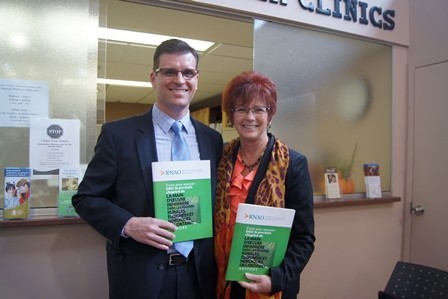A comprehensive approach is needed to ensure there is an adequate supply of #nurses to look after the health and wellbeing of people living in rural, remote and northern regions of the province.
That’s a key finding of a provincial task force launched by the Registered Nurses’ Association of Ontario (#RNAO) and co-chaired by David McNeil, Vice President Patient Services, Clinical Transformation and Chief Nursing Executive at Health Sciences North, and Louise Paquette, Chief Executive Officer of the North East Local Health Integration Network (LHIN).
The two long-time northern residents released RNAO’s report on May 11 in Sudbury. Coming Together, Moving Forward: Building the Next Chapter of Ontario’s Rural, Remote and Northern Nursing Workforce sheds light on why it’s difficult to retain and recruit nurses, and proposes 23 recommendations that will help stem a shortage of nurses working in these communities.
MORE: GAME CHANGERS: TOP 10 HEALTH TECHNOLOGIES
RNAO launched the task force – composed of more than a dozen experts in the health field – in April 2014 with a mandate to come up with strategies to help build a more sustainable nursing workforce for rural, remote and northern areas of the province. The consultation process included examining evidence, scanning what other jurisdictions and professions have done, and listening to hundreds of registered nurses (RN), nurse practitioners (NP), registered practical nurses (RPN), and nursing students.
“Without a doubt, nurses play a pivotal role in our health system. And the particular challenge we uncovered was the need to improve access to care, because nurses provide the hands-on care patients require,” says Paquette, adding that she is confident the recommendations will help attract and retain nurses.
Among the recommendations:
- Invest and support strategies that will result in 70 per cent of nurses working full time
- Address compensation inequities between community and hospital sectors
- Develop a framework, practice standards and education pathways that support an expanded scope of practice in rural, remote and northern sectors, including RN prescribing
- Improve access to nursing education by bringing it closer to home and supporting First Nations, Inuit, Métis and Francophone persons to become nurses
- Develop partnerships to support the travel and accommodation needs of nursing students seeking placements in rural, remote or northern settings
- Provide funding for nursing orientation programs for newly hired nurses to rural, remote or northern communities
- Relieve short-term staffing gaps through organizational partnerships instead of relying on temp agencies and overtime to backfill vacation/leave
- Create and support access to dedicated continuing education that recognizes the unique nature of #rural nursing practice
- “The task force has acknowledged that a shared responsibility is needed to address the historical gap in nursing services in our rural, remote and northern communities, and the time to begin taking action is now,” Grinspun says. “This way, we can ensure swift implementation of the solutions we propose to make sure we are doing all we can to meet the unique care needs of people who live in these communities.”
- RNAO CEO Doris Grinspun commended Paquette, McNeil and the rest of the members of the task force for their work. A collaborative effort from all levels of government, health organizations, associations, educators, and community partners is needed, she says, and so the task force has proposed leaders and stakeholders to guide the implementation of each of the report’s recommendations.
- Co-chair David McNeil, who is also a past-president of RNAO, has experience working in a remote nursing station. He says the report is timely and can remedy recent concerns highlighted by the Auditor General of Canada. Earlier this month, Auditor General Michael Ferguson released a review of health services in dozens of First Nations communities in Ontario and Manitoba. “A number of our recommendations deal directly with concerns about scope of practice, education and training and we are certain the recommendations put forth by the task force will improve quality of care in remote regions where First Nations, Inuit and Metis populations live,” McNeil says. “Nurses and others have been inspired by the association’s decision to focus on rural, remote and northern nursing challenges.”
MORE: PLANNING FOR OUR HEALTHY FUTURE
To read the task force report, visit www.RNAO.ca/RuralRemote




